Environmental Racism: A Resource Guide
October 23, 2025
Jenny Amadi, Angela Ciceron, Sarah Deckert and Florence Lange
On September 22, 2025, we met at the Assiniboine and Red Rivers to discuss how Winnipeg’s wastewater reflects and perpetuates environmental racism and colonialism. Dr. Kathy Bird spoke about the interconnectedness of the waters and reminded us that what we do to the waters in Winnipeg impacts our neighbours downstream. With profound insight and storytelling, she called us to a deep respect for the waters, both in spirit and in action. Dr. Jocelyn Thorpe shared about the reality of sewage that flows into the rivers not only when pipes break but when we have a heavy rainfall and the combined sewers overflow. Finally, Councillor Brian Mayes brought our attention to the need for federal support for the North End Sewage Treatment Plant upgrades, which would greatly reduce the amount of nutrients that flow into Lake Winnipeg.
This resource guide was created as a starting point for those seeking to learn more about environmental racism.
Download the screen reader friendly Environmental Racism Resource Guide here:

Guide for Inclusive and Accessible Design Principles
Guide for Inclusive and Accessible Design Principles
June 1, 2025
Shaylyn Pelikys
While designing social media content and resources for the Just Waters project, student researcher Shaylyn Pelikys took the time to create this Guide for Inclusive and Accessible Design Principles in an effort to support our team in creating resources that are accessible for everyone to use. We’re happy to share this important resource so that you can also start your journey towards creating more inclusive and accessible designs!
Download the screen reader friendly Guide to Inclusive and Accessible Design Principles here:

A Resource Guide on Missing and Murdered Indigenous Women, Girls, Two-Spirit and Gender Diverse People in Canada
A Resource Guide on Missing and Murdered Indigenous Women, Girls, Two-Spirit and Gender Diverse People in Canada
October 15, 2024
Angela Ciceron

Trigger Warning: The content in this resource guide may be difficult and/or triggering. If you or someone you know needs emotional assistance related to this topic or the information in this article, help is available 24/7 through the MMIWG Support Line, 1-866-413-6649.
In May 2024, the Centre for Human Rights Research and Indigenous Engagement and Communications hosted Cambria Harris in honour of Red Dress Day. This resource guide was created to provide a starting point for people seeking to educate themselves about the issue of missing and murdered Indigenous women, girls, Two-Spirit, and gender diverse people (MMIWG2S+) in Canada. It also lists resources for those seeking help or resources in line with MMIWG2S+.
Related Resources
Support Us
Whether you are passionate about interdisciplinary human rights research, social justice programming, or student training and mentorship, the University of Manitoba offers opportunities to support the opportunities most important to you.
Migrant Justice and Human Rights: A Resource Guide
Migrant Justice and Human Rights: A Resource Guide
April 2024
Angela Ciceron
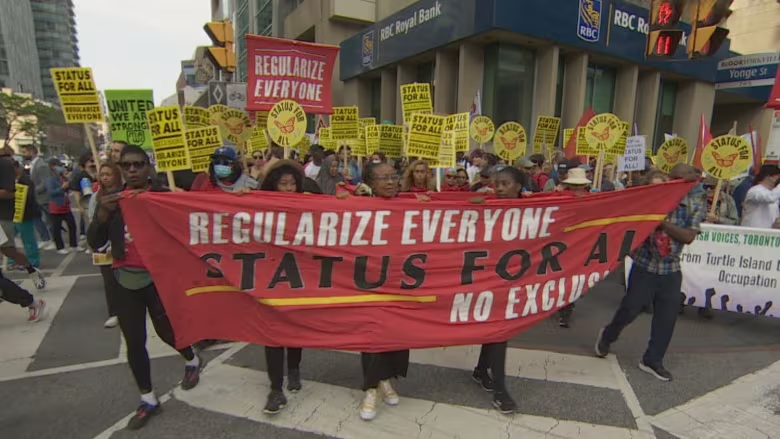
In March 2024, the Centre for Human Rights Research hosted Mostafa Henaway, a long-time community organizer with Immigrant Workers Centre in Montreal. Henaway’s work emphasized the structural and transnational issues propelling migrant workers to undertake precarious work under neoliberal capitalism, as well as efforts made by migrants to resist these structures. This resource guide aims to expand on this conversation by providing resources on the experiences of migrant workers under neoliberalism and their role in Canadian society more broadly.
Related Resources
Support Us
Whether you are passionate about interdisciplinary human rights research, social justice programming, or student training and mentorship, the University of Manitoba offers opportunities to support the opportunities most important to you.
Wrongful Convictions and Systemic Racism: A Resource Guide
Wrongful Convictions and Systemic Racism: A Resource Guide
November 2023
Stephen Carney, Alana Conway, Carlie Kane, Dr. Pauline Tennent
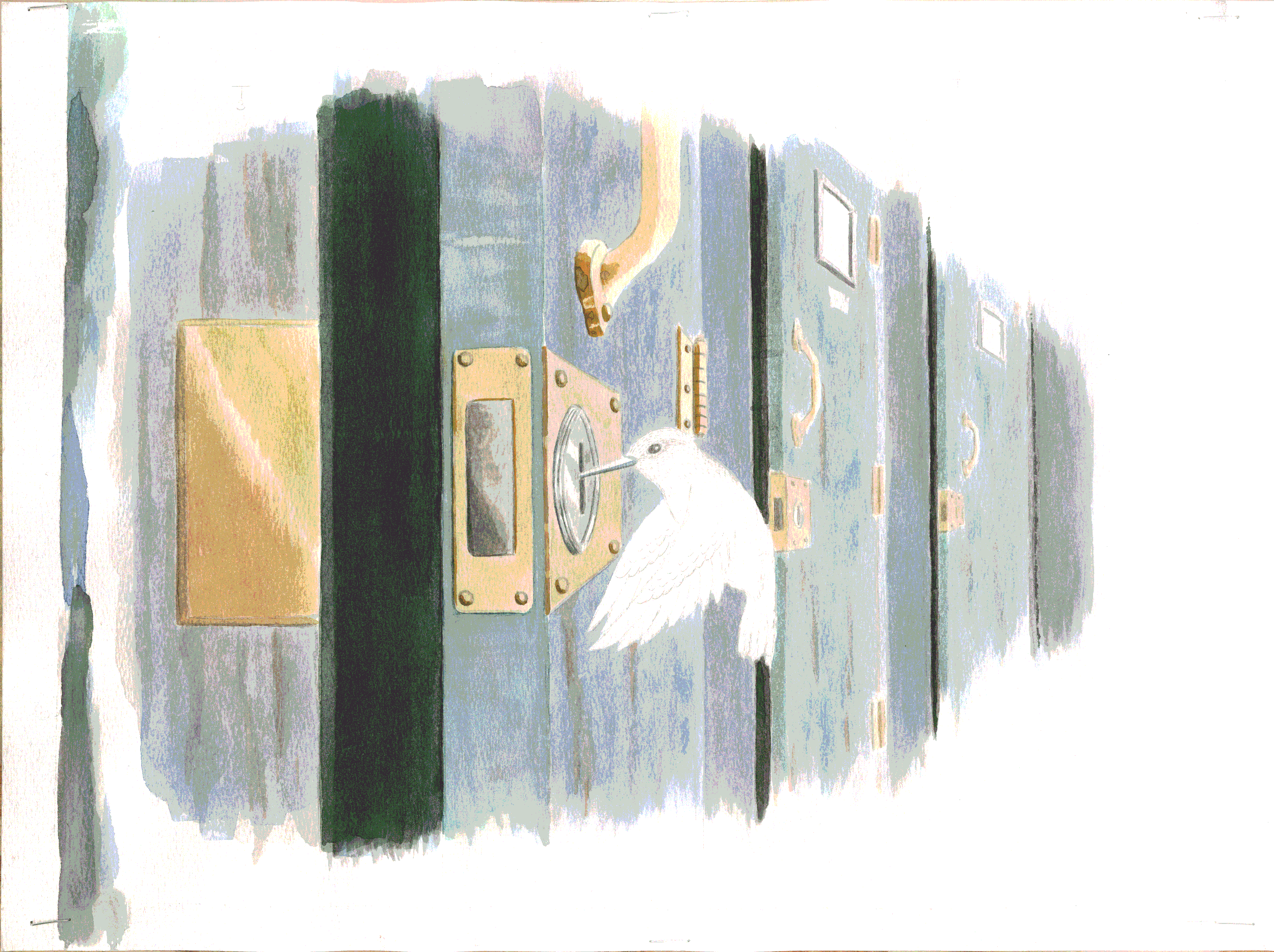
A Resource Guide with links to resources related to wrongful convictions and the impact of systemic racism and discrimination on the justice systems in settler colonial contexts such as Canada, the United States, and other countries around the world.
Related Resources
Support Us
Whether you are passionate about interdisciplinary human rights research, social justice programming, or student training and mentorship, the University of Manitoba offers opportunities to support the opportunities most important to you.
Land and Settler Colonialism in southern Manitoba: A Resource Guide
Land and Settler Colonialism in southern Manitoba: A Resource Guide
November 2023
Dr. Adele Perry, Dr. Shelisa Klassen
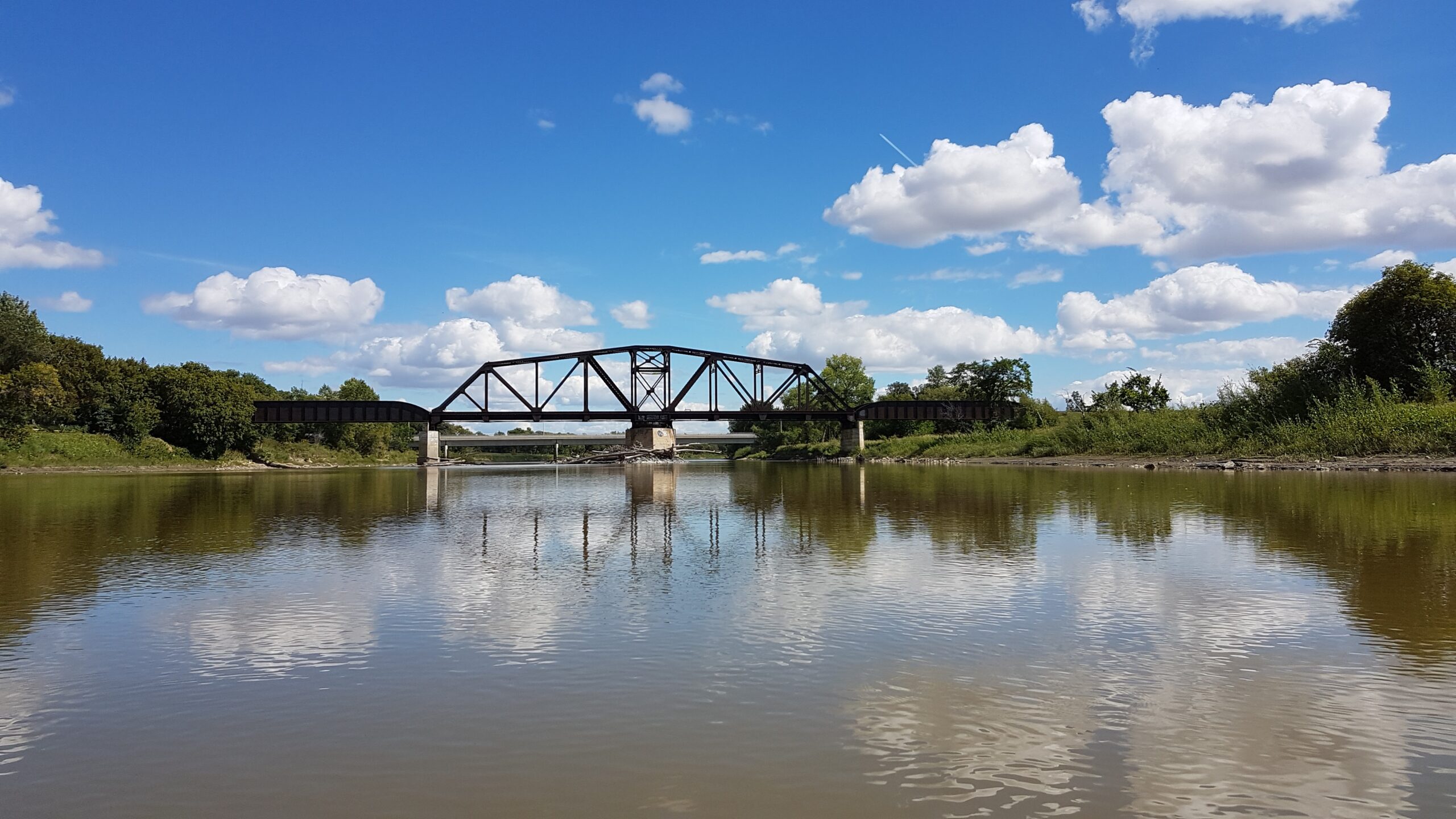
A resource guide to learn more about land and settler colonialism in southern Manitoba.

Islamophobia and Colonial Violence: Solidarity and Civil Resistance in Post-9/11 Manitoba — A Resource Guide
Islamophobia and Colonial Violence: Solidarity and Civil Resistance in Post-9/11 Manitoba -- A Resource Guide
October 2023
Angela Gail Ciceron, Dr. Pauline Tennent, Dr. Youcef Soufi
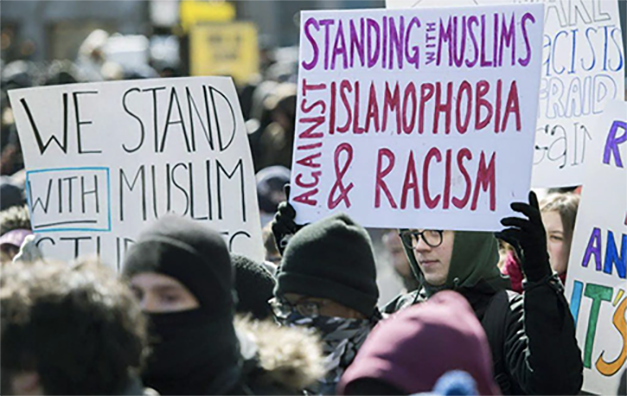
On October 25, 2023, the Centre for Human Rights Research (CHRR) hosted a seminar on the topic of islamophobia and colonial violence with Dr. Youcef Soufi from the Institute of Islamic Studies at the University of Toronto. The event focused on the experiences of solidarity and civil resistance of Muslim Canadians in the aftermath of 9/11 and during the US’s global war on terror. As an extension of the seminar, this resource guide provides further readings and media for participants who would like to deepen their understanding of islamophobia in the context of Canada.
Related Resources
Support Us
Whether you are passionate about interdisciplinary human rights research, social justice programming, or student training and mentorship, the University of Manitoba offers opportunities to support the opportunities most important to you.
Resource Hub
Doing the Work: What Settlers need to know about the Residential School System: Resource Guide
September 23, 2023
Dr. Pauline Tennent and Laura Majendaagoz . With Contributions from: Elder Betty Ross, Clayton Sandy, Dr. Sean Carleton, Dr. Brian Gettler, Dr. Erin Millions, Dr. Adele Perry, Dr. Andrew Woolford, Monique Woroniak
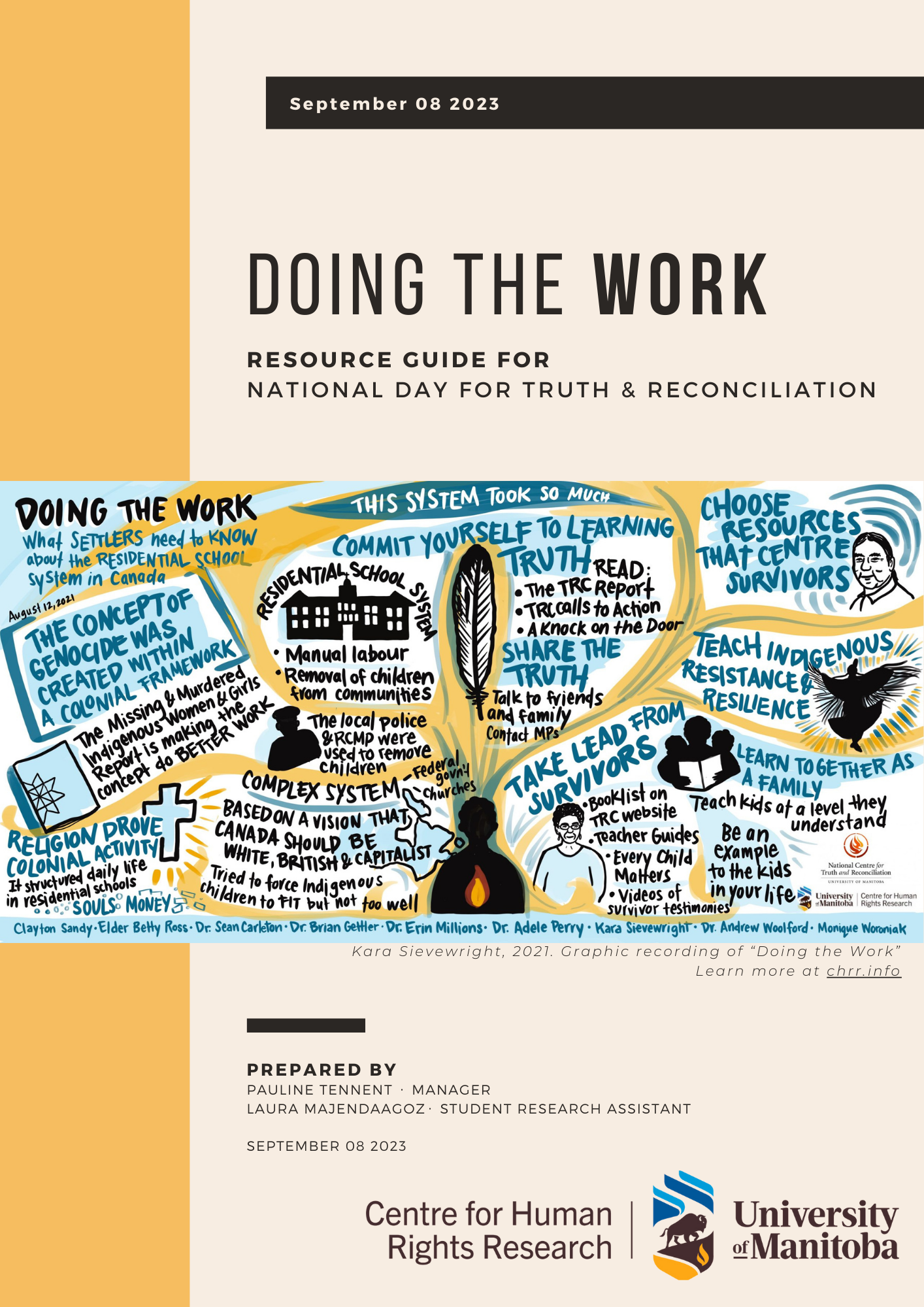
On Thursday, August 12th 2021, the Centre for Human Rights Research hosted “Doing the Work: A virtual Q & A on what settlers need to know about the residential school system in Canada.” Following the event, the panel created a resource guide, intended as a living document, with information on residential schools and the impact of colonialism in Canada. This resource guide was updated in August 2023.
Related Resources
Support Us
Whether you are passionate about interdisciplinary human rights research, social justice programming, or student training and mentorship, the University of Manitoba offers opportunities to support the opportunities most important to you.
Borders and Human Rights: A Resource Guide
2022
Sara Gibson
This is a short list of resources compiled by Research Assistant Sara Gibson, of books, articles, poems, videos etc. that provide a critical look at borders and human rights. It is only a starting point for “Questioning Borders” and we look forward to adding to it. Please email chrrman@umanitoba.ca if you have suggestions.

Canadian Aboriginal Law
2024
Carlie Kane
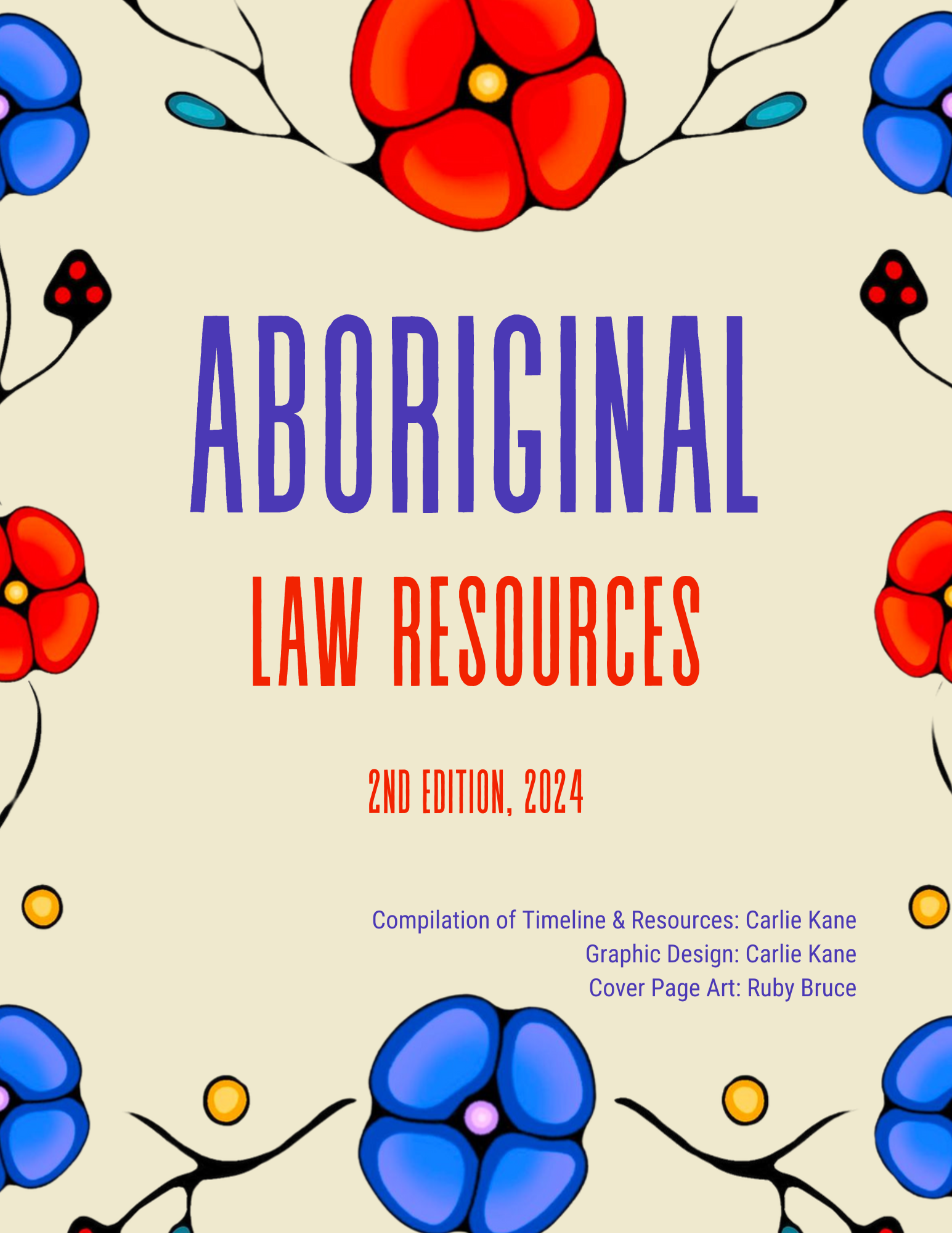
Canadian Aboriginal law is a body of law in Canada that focuses on the rights and issues of Indigenous peoples (First Nations, Métis and Inuit) in Canada. Aboriginal law is different from Indigenous law. Indigenous law refers to legal traditions, customs and practices of Indigenous peoples. To further clarify, Aboriginal law is generally considered to be the law of the state (Canada), and comes from legislation and the common law through the courts and the Constitution; whereas, Indigenous law refers to Indigenous peoples’ own law, such as customs, songs, dances, stories, language, and ceremonies.
– Carlie Kane, J.D., Former Research Assistant, Centre for Human Rights Research
This document is a compilation of Indigenous legal resources from various scholars and resources. A full reference list is available at the end of the resource guide.
Related Resources
Support Us
Whether you are passionate about interdisciplinary human rights research, social justice programming, or student training and mentorship, the University of Manitoba offers opportunities to support the opportunities most important to you.
Contact Us
We’d love to hear from you.
442 Robson Hall
University of Manitoba
Winnipeg, Manitoba
R3T 2N2 Canada
204-474-6453
Quick Links
Subscribe to our mailing list for periodic updates from the Centre for Human Rights Research, including human rights events listings and employment opportunities (Manitoba based and virtual).
Land Acknowledgement
The University of Manitoba campuses are located on original lands of Anishinaabeg, Ininew, Anisininew, Dakota and Dene peoples, and on the National Homeland of the Red River Métis.
Centre for Human Rights Research 2023© · Privacy Policy

